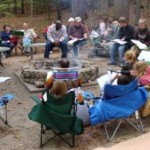What does it mean to admonish?
In yesterday’s post, “The Unmentionable One Anothers,” I listed several “one another” instructions that we prefer not to think about, that we prefer to shift off to others, that we would rather not have as our own responsibilities toward one another.
In this post, I’d like for think about the instruction “admonish one another.” According to the dictionary, “admonish” means “1) Warn or reprimand someone firmly or 2) Advise or urge (someone) earnestly.”
We find this instruction in a couple passages of Scripture. In Colossians, Paul says that “admonishing” is one of the things that he does to help the church, and he says that it’s one of the ways all believers should respond when “the word of Christ dwells in [them]”:
Him we proclaim, warning [admonishing] everyone and teaching everyone with all wisdom, that we may present everyone mature in Christ. (Colossians 1:28 ESV)
Let the word of Christ dwell in you richly, teaching and admonishing one another in all wisdom, singing psalms and hymns and spiritual songs, with thankfulness in your hearts to God. (Colossians 3:16 ESV)
The two verbs highlighted above (one translated “warning” and the other translated “admonishing”) are actually the same verb – the one that is often translated “admonish.”
Similarly, when Paul wrote to the believers in Rome, he said that he knew that they had all they needed to admonish one another:
I myself am satisfied about you, my brothers, that you yourselves are full of goodness, filled with all knowledge and able to instruct [admonish] one another. (Romans 15:14 ESV)
Again, the highlighted verb above is the one normally translated “admonish,” and is a different verb from the one normally translated “teach” or “instruct.”
Finally, we see that Paul includes “admonishing” in the work of leaders among the church and in the work of all “brothers and sisters”:
We ask you, brothers, to respect those who labor among you and are over [lead] you in the Lord and admonish you, and to esteem them very highly in love because of their work. Be at peace among yourselves. And we urge you, brothers [and sisters], admonish the idle, encourage the fainthearted, help the weak, be patient with them all. (1 Thessalonians 5:12-14 ESV)
There are a few others passages in which one or more people are said to admonish others.
But, what does it mean to admonish? How do we admonish someone while still loving them? How do we admonish someone without “lording it over them”? How do we admonish someone without taking the place of Jesus Christ in their life?
Checking in on One Another
The “One Another” chain blog is still going strong. Another new link post was just added to the chain yesterday!
As I’m writing this, it’s been 17 days since I started the chain blog back on October 1, 2012 with a post called “Chain Blog: One Another.” That post has been updated with all the latest link posts.
About a week later, I wrote an update/summary post called “Blog with One Another: A Chain Blog Update.” That post also had all the updated link posts as well as a short “teaser” from each post.
While we’ve covered many topics related to the topic “one another,” I think there are still many topics to cover. In fact, I have an idea for another topic. So, I may jump in again in a few days.
The more voices involved and the more topics covered, the better this chain blog will be. Do you want to take part in our chain blog? Then jump over the last link post in the chain and leave a comment that you want to write the next post. (See the two posts above for the links.)
Blog with One Another: A Chain Blog Update
At the beginning of last week, I started a “chain blog” on the topic of “one another.” A chain blog is an event – or process actually – in which several bloggers write about the same topic, one after that other. In this case, we’re writing about the topic of “one another” and various aspects of that topic.
So far, seven eight nine A BUNCH OF bloggers have taken part in the chain blog writing 8 9 10 A BUNCH OF posts (since Greg’s was in 2 parts). I think – if I remember correctly – this is the fastest moving chain blog so far.
Here are the posts in the chain blog so far (with a little tease):
1. “Chain Blog: One Another” by Alan
What does this mean for those of us who are following Jesus Christ? Well, it helps us to understanding the importance of our mutual relationships with one another in Jesus Christ when we read statements in Scripture like “love one another,” “teach one another,” “be kind to one another,” “edify one another,” “forgive one another,” “admonish one another,” etc.
2. “Linking One Another” by Swanny
“Us”conditional love must be avoided at all costs because it sends the message to people that they have no value (or are not right with God) unless they are complying with the demands, the rules, or the “what we believe” statements the local church rulers pulled out of their behinds.
3. “What Does It Mean to Love One Another? by Chuck
For almost every action we take, we have a choice. We can walk by the flesh, or we can walk by the Spirit. If we walk by the flesh, we will act selfishly—seeking our own good. If we walk by the Spirit, we will act in love—seeking the good of others.
4. “The treasure of “One Another” by Jim
To live “in” Christ is to be free from our natural way of dividing, or establishing borders. This indeed makes us vulnerable, yet at the same time secure. We are vulnerable to those that choose to take advantage of our freedom, and lack of borders. Yet our defense is not our defense, but of, and “in” Christ.
5. “This is how the world shall recognise you…” by Kathleen
The world we live in is desperate for true community. Social media is allowing people to be more connected than ever before – but they still need something more. The world needs to see God’s people loving one another – deeply connected, living life together, engaging in the messiness of each other’s lives.
6. “Accepting one another in love by Chris
If I demonstrate love and others copy my example, great benefit and joy and peace will result! If I demonstrate judgement and others copy my example, great misery and shame and angst will result. Why do we find it so hard to go first in love? And why do we find it so easy to go first in judgement?
7. “One Another-ing: A meta-narrative for the church” – Part One and Part Two by Greg
Our one another-ing on earth are really mirror reflections of God’s one another-ing toward us from heaven and this short journey in time we have with one another is the first draft in the unedited script of life together forever.
8. “Individualism and ‘one another’” by Pieter
In living out the “one another” directives of the Lord we need to focus on “putting others before yourselves in honour” in the (Christian) community. The most effective way to do that is to have a servant attitude.
9. “All Alone with One Another” by Jeremy
I always find it interesting when pastors and teachers tell us that we can fulfill the “one anothers” in Scripture by joining a church, faithfully attending on Sunday morning, Sunday night, and Wednesday night, and by getting involved in a church ministry. In my experience–and I don’t think I am “alone” in this–such activities do little to quell the sense of being all alone with one another in church. The solution to feeling alone in church is not to attend more church services and Bible studies.
10. “When it’s OK for Christians to compete” by Joshua
It’s hard for me to imagine God as being competitive. Nor do I find my own competitive urges to be very much in line with the call to love and serve other people. Quite to the contrary, competition lends itself more toward pride and ambition than it does humility and sacrifice. Yet there is one clear instance in scripture where disciples of Christ are encouraged to be competitive.
11. “Jesus Christ, the Corner Stone for One Another” by Peter
This costly, chief Corner Stone is the basis on which, we relate to one another. This Corner Stone unites us. The old creation is full of every division imaginable. But, there is no division in the new creation. In Christ, we are altogether together One.
12. “Be Superficial with One Another” by Jon
Maybe it is best that we all just act superficially with one another. We can smile and be friendly and make small talk about sports, weather, or recent shared experiences. But it is probably best to stick to safe topics.
13. “The Unmentionable One Anothers” by Alan
Love one another. Be kind to one another. Forgive one another. We love these nice “one anothers,” but there are other “one another” instructions that we don’t like to talk about.
14. “Loving More Fully and Widely” by Chris
We’re going to see how much we can draw from a single occurrence of the phrase ‘one another’. I think Romans 13:8 is the particular example I should take.
15. “The One Another Weapon” by Dan
See, the biggest thing to remember is that these passages should not be interpreted through the perspective of how I should act toward others, but how others should act toward me. When you shift your focus from others to yourself you can really start tapping into the power of the “one another” passages!
16. “Corporate One-Anothering” (Part 1 and Part 2) by David
We all know that the “one another” verses in the New Testament are written to individuals and are to be put into practice among the members of the Body of Christ as the fabric of their life together in Christ. Something we also see modeled in the New Testament, however, is various churches or groups of believers putting some of these same “one another” exhortations into practice on a corporate level.
17. “The Last Revival” by Tobie
And so a long and intimate conversation began between the two fingers. They were amazed at how similar they were. They could relate with one another’s frustrations, hurts and dreams. They found it astonishing that they both preferred to touch rather than be touched, and they had many other traits in common. They soon became best friends, and began spending almost all of their free time together, speaking about the things that fingers most like to speak about.
18. “Love: A one another comic” by Dan
The modern church method of loving one another?
19. “I Can Only Love You If…” by Rob
Let’s face it, whenever we are not regarding each and everyone with their unique background, personality and gifting, whether in the body of Christ or not, MORE highly than ourselves, then we are in the FLESH and SIN.
20. “It Was Lost in Translation” by Nelson
This scripture tells us that teaching and admonishing are two way exercises. I don’t know for sure, but it seems to me that ‘teaching and admonishing’ is one thing with two parts. It also seems to me that it takes place as a natural part of being in the same body.
So, who will write the eighth ninth tenth NEXT link post in the chain blog? If you want to take part, jump over to the last post in the chain and leave a comment that you’ll write the next post.
—————————————————
Chain blog rules:
1) If you would like to write the next blog post (link) in this chain, leave a comment stating that you would like to do so. If someone else has already requested to write the next link, then please wait for that blog post and leave a comment there requesting to write the following link.
2) Feel free to leave comments here and discuss items in this blog post without taking part in the actual “chain.” Your comments and discussion are very important in this chain blog (both this post and the other link posts in the chain).
3) When you write a link in this chain, please reply in the comments of the previous post to let everyone know that your link is ready. Also, please try to keep an updated list of links in the chain at the bottom of your post, and please include these rules at the bottom of your post.
For Paul, freedom means independence, dependence, and interdependence
Lately, I’ve been re-reading one of my favorite academic books on the church: Paul’s Idea of Community by Robert Banks (Peabody: Hendrickson, 2004). Like almost any book, there are both positive and negatives aspects – strengths and weaknesses. But, this book has a special place in my own heart.
Why is this a special book for me? This is one of the first books that I read in which I was encouraged that my understanding of the church could be presented in both popular and academic formats. There have been several other books since then, but this was one of the first.
Chapter names like these would persuade most of my blog readers that I would like this book (and they would be right): “Church as Household Gathering,” “The Community as a Loving Family,” “The Community as a Functional Body,” “Physical Expressions of Fellowship,” “Gifts and Ministry,” “Charisma and Order,” and “Unity in Diversity among the Members.”
But, this time, as I read through the book again, I was intrigued by Banks’ description of salvation as freedom (in Paul’s writings). I especially enjoyed this summary:
To summarize, freedom for Paul consists of three main components:
Independence
- from certain things, e.g., sin, the Law, death, and alien powers
- for certain things, e.g., righteousness, conformity to Jesus, suffering
- resulting in a personal and life-giving experience of liberty.
Dependence
- upon Christ, who terminated humanity’s enslavement through his death and resurrection
- upon the Spirit, who communicates Christ’s life and purpose as a received divine gift rather than innate possibility.
Interdependence
- with others, since liberty leads to service and can only be practically defined in relation to their needs
- with the world, since the universe itself will experience the liberty of transformation along with those who are Christ’s
- giving liberty a social and cosmic, as well as a personal and theocentric, dimension.
(page 25)
Our relationship with one another as the family of God (the church) is definitely based on the person and character of God himself. In the same way, however, our relationship with one another is also based on the salvation (and resulting freedom) that we have in God through Jesus Christ enacted by the Holy Spirit. Thus our salvation and our freedom are personal, but not only personal; it is also mutual and communal, in the sense that our connection with God is also interconnection with one another.
When we are set free from (independent of) our sin, we also become dependent on Jesus Christ and the Holy Spirit and interdependent with one another.
Most of us (and I included myself in this) focus on one aspect of salvation (freedom, as Banks describes it above). We focus on being set free from sin. Or we focus on our dependence on God. Or we focus on our interdependence with one another. But, a more complete understanding of salvation (freedom) would include all three aspects of independence, dependence, and interdependence as listed above.
Which of the three aspects of freedom/salvation listed above (independence, dependence, interdependence) do you think you primarily focus on? Do you see any benefit in including all three in our understanding of salvation/freedom?
Is a theological disagreement a stumbling block?
In 1 Corinthians 8 and Romans 14, Paul asks his readers to care more about their brothers and sisters in Christ than in claiming their own freedoms in Christ. In those passages, Paul was talking about theological disagreements. By claiming their rights in these areas of theological disagreement, they could make themselves into stumbling blocks for their brothers and sisters in Christ.
But, does that mean that any theological disagreement is a stumbling block? No.
Now, don’t misunderstand me. Any theological disagreement (any disagreement actually – even a disagreement that we might think is minor or trivial) MIGHT be a cause of stumbling. But, disagreements are not causes of stumbling in and of themselves.
It’s entirely possible – and it happens all the time – that two Christians can disagree without one causing the other to stumble. It’s possible – and it happens all the time – that one follower of Jesus can offend another without either one causing the other to stumble.
When Paul writes about one person causing another to stumble in 1 Corinthians 8 and Romans 14, he’s talking about something particular. Look at these passages from those chapters:
For if your brother is grieved by what you eat, you are no longer walking in love. By what you eat, do not destroy the one for whom Christ died. So do not let what you regard as good be spoken of as evil. (Romans 14:15-16 ESV)
Do not, for the sake of food, destroy the work of God. Everything is indeed clean, but it is wrong for anyone to make another stumble by what he eats. It is good not to eat meat or drink wine or do anything that causes your brother to stumble. The faith that you have, keep between yourself and God. Blessed is the one who has no reason to pass judgment on himself for what he approves. But whoever has doubts is condemned if he eats, because the eating is not from faith. For whatever does not proceed from faith is sin. (Romans 14:20-23 ESV)
However, not all possess this knowledge. But some, through former association with idols, eat food as really offered to an idol, and their conscience, being weak, is defiled. (1 Corinthians 8:7 ESV)
But take care that this right of yours does not somehow become a stumbling block to the weak. For if anyone sees you who have knowledge eating in an idol’s temple, will he not be encouraged, if his conscience is weak, to eat food offered to idols? And so by your knowledge this weak person is destroyed, the brother for whom Christ died. (1 Corinthians 8:9-11 ESV)
In each case above, disagreement is not the problem. Offense is not the problem. The problem is that the actions of one Christian is causing (or encouraging) another Christian to do something that he or she considers to be sin. We become a stumbling block when living out our freedom in Christ gives others justification to disobey Christ (in their own understanding).
Obviously, these are serious issues. We do not want to encourage our brothers and sisters to do anything that they would consider to be disobedience or sin. At the same time, we should recognize that all disagreements are not stumbling blocks.
Instead, we have to know our brothers and sisters in Christ and know what would be a real encouragement for them and what would be a discouragement to them.
Replay: Living doctrine at the campsite
Three and a half years ago, I wrote a post called “Living doctrine at the campsite.” When I wrote that post, we had just spend a weekend camping together with the church. As you can imagine, we spent alot of time together, did alot of different things together, and even talked about alot of Scripture together. At one point, we talked about Acts 2:42 together, and I realized that we had been living that passage during our camping weekend. The weekend with our brothers and sisters reminded me of the important connection between doctrine and community.
———————————–
Living doctrine at the campsite
This weekend, we went camping with the church. Friday evening, several families camped near Falls Lake. A couple of families joined us around the campfire Friday night. The next day, one family had to leave, but two more families camped with us. Several people joined us during the day on Saturday to spend time together at the campsite.
Sunday morning, many people who did not camp came to the campsite to meet together. We sat around the campfire (well, the remains of the campfire), and talked and sang and prayed. We talked about several different topics, but at one point, the discussion turned to Acts 2:42:
And they devoted themselves to the apostles’ teaching and fellowship, to the breaking of bread and the prayers. (Acts 2:42 ESV)
According to this passage, the early church in Jerusalem devoted themselves to the apostle’s teaching (or doctrine). We talked about how the church often interprets this phrase as “they spent time listening to the apostles teach”. But, as many people pointed out, this simply sentence goes far beyond listening to someone teach.
Yes, the early church continued steadfastly in the apostles’ doctrine, but they did not do this with their ears only; they continued in their lives. They lived what the apostles were teaching them.
As I was listening to my friends sitting around the campfire helping one another understand what it means to live out the doctrine of the apostles, I couldn’t help but remember the previous 48 hours that I had spend with many of my brothers and sisters in Christ. You see, I heard what they were saying Sunday morning, but Friday night and all day Saturday, I SAW them continuing steadfastly in the teachings of the apostles.
It’s one thing to hear someone encourage others to confess their sins, but it’s another thing altogether to have a brother confess his sins to you. It’s one thing to hear an exhortation to love one another, but it’s another thing altogether to see brothers and sisters who want to spend time with one another, who share their food with one another, who help one another around the campsite, who SHOW their love for one another.
As I sat around that campfire Sunday morning, I couldn’t help but praise God for the blessing of community – not community in name only, but true community – a family who loves one and cares for one another. We’re not perfect, and we’re continually seeking to grow closer to God and to one another, but we are a community.
It’s easy to see now why Luke connected “the apostles’ teaching” and “fellowship”. I don’t think you can have one without the other.
(If you’re interested, I’ve posted pictures from our camping weekend on our family blog and in a facebook photo album.)
Chain Blog: One Another
Last Friday, I proposed that we start a new chain blog. (If you don’t know what a chain blog is, you can read the info in my post “Interested in a Chain Blog? Let’s pick a topic.,” or you can keep reading below for more info.)
In that post, several topics were suggested, but most people seem to have been interested in the following topic: “one another.”
So, in this post, I’m going to introduce the topic. “One another” is a phrase that points toward many instructions, commands, and examples in the New Testament. It is the translation of a couple of Greek terms which are reciprocal pronouns.
Reciprocal Pronouns
A reciprocal pronoun indicates that more than one person is involved in both carrying out an activity and in the results of the activity. Thus, when Scripture indicates that we should “love one another,” “teach one another,” “exhort one another,” “serve one another,” etc., these are mutual activities in which more than one person is involved in both the activity and the result.
Mutuality
While there are several different ways to refer to the kinds of activities in which more than one person is involved in both carrying out the activity and the result of the activity, I prefer the term “mutuality.” Mutuality is different than individualism, but it is also different than collectivism. In a mutual relationship, the group works together for the benefit of the group (this sets apart mutuality from individualism), but they do not work together under duress or force (this sets apart mutuality from collectivism).
Our Mutual Relationships
What does this mean for those of us who are following Jesus Christ? Well, it helps us to understanding the importance of our mutual relationships with one another in Jesus Christ when we read statements in Scripture like “love one another,” “teach one another,” “be kind to one another,” “edify one another,” “forgive one another,” “admonish one another,” etc.
The Chain Blog
In this chain blog, each author will pick a topic related to “one another.” Together we will work toward a better understanding of these reciprocal pronouns and the mutual relationships that they point to.
—————————————————
Chain blog rules:
1) If you would like to write the next blog post (link) in this chain, leave a comment stating that you would like to do so. If someone else has already requested to write the next link, then please wait for that blog post and leave a comment there requesting to write the following link.
2) Feel free to leave comments here and discuss items in this blog post without taking part in the actual “chain.” Your comments and discussion are very important in this chain blog (both this post and the other link posts in the chain).
3) When you write a link in this chain, please reply in the comments of the previous post to let everyone know that your link is ready. Also, please try to keep an updated list of links in the chain at the bottom of your post, and please include these rules at the bottom of your post.
—————————————————
“Links” in the “One Another” chain blog:
1. “Chain Blog: One Another” by Alan
2. “Linking One Another” by Swanny
3. “What Does It Mean to Love One Another? by Chuck
4. “The treasure of “One Another” by Jim
5. “This is how the world shall recognise you…” by Kathleen
6. “Accepting one another in love” by Chris
7. “One Another-ing: A meta-narrative for the church” – Part One and Part Two by Greg
8. “Individualism and ‘one another’” by Pieter
9. “All Alone with One Another” by Jeremy
10. “When it’s OK for Christians to compete” by Joshua
11. “Jesus Christ, the Corner Stone for One Another” by Peter
12. “Be Superficial with One Another” by Jon
13. “The Unmentionable One Anothers” by Alan
14. “Loving More Fully and Widely” by Chris
15. “The One Another Weapon” by Dan
16. “Corporate One-Anothering” (Part 1 and Part 2) by David
17. “The Last Revival” by Tobie
18. “Love: A one another comic” by Dan
19. “I Can Only Love You If…” by Rob
20. “It Was Lost in Translation” by Nelson
21. “Consider Others Better Than Yourself” by Chuck
22. Who will write the 22nd link post in the chain?
The Pilgrim Church: The whole church cannot be seen and cannot act in any one place
Yesterday, in a comment on another post, Chuck from “Being Filled” mentioned a book that I had not heard of before but which is available free online: The Pilgrim Church by E.H. Broadbent.
The book has the following subtitle: “Being some account of the continuance through succeeding centuries of churches practising the principles taught and exemplified in the New Testament.”
Unfortunately, I haven’t had time to read much of this book, but I did read a page or two. And, at the very beginning (the third and fourth paragraph), I read this:
As this body, the whole Church of Christ, cannot be seen and cannot act in any one place, since many of its members are already with Christ and others scattered throughout the world, it is appointed to be actually known and to bear its testimony in the form of churches of God in various places and at different times. Each of these consists of those disciples of the Lord Jesus Christ who, in the place where they live, gather together in His Name. To such the presence of the Lord in their midst is promised and the manifestation of the Holy Spirit is given in different ways through all the members (Matt. 18.20; 1 Cor. 12.7).
Each of these churches stands in direct relationship to the Lord, draws its authority from Him and is responsible to Him (Rev. 2 and 3). There is no suggestion that one church should control another or that any organised union of churches should exist, but an intimate personal fellowship unites them (Acts 15.36).
Like I said, I haven’t read much more than this in the book, but I have an idea that this quote tells us quite a bit about the focus of Broadbent’s book (the lack of “organized union of churches” for example). So far, I like his foci:
- Believers that are scattered around the world.
- All disciples of Jesus Christ in one area united together.
- Each church under the authority of Jesus Christ alone.
- A church connected to one another through fellowship and relationships.
Of these various concepts, I only see the first one actively displayed today. We recognize generally that believers are scattered around the world. But, we rarely see all disciples in one are united together, acting under the authority of Jesus Christ alone, and connected to one another through fellowship and relationship.
In fact, while we recognize believers scattered around the world today, we typically accept that we are also scattered locally as well. And, for the most part, we’re happy with that.
You see, when Broadbent writes, “[T]he whole Church of Christ cannot be seen and cannot act in any one place,” he means that we are scattered around the world. But, today, we would have to say that “the whole Church of Christ cannot be seen and connection act in any one place” – in any one location – because we are divided from one another and refuse to unite in the Spirit of God.
It makes me wonder… whatever divides me from brothers and sisters in Christ is something that I’m submitting to instead of submitting to God.
Guest Blogger: The abolition of social distinctions among the church
I’ve invited people to write “guest blog posts” for this blog. There are several reasons for this: 1) To offer different perspectives. 2) To generate even more discussion and conversation between blogs. 3) To introduce other bloggers to my readers.
(If you are interested in writing a guest blog post, please contact me at aknox[at]sebts[dot]com.)
Today’s post was written by Theo. You can connect with Theo via Twitter (@TheosJourney).
——————————————-
The Abolition of Social Distinctions Among the Church
My brethren, do not hold your faith in our glorious Lord Jesus Christ with an attitude of personal favoritism. For if a man comes into your assembly with a gold ring and dressed in fine clothes, and there also comes in a poor man in dirty clothes, and you pay special attention to the one who is wearing the fine clothes, and say, “You sit here in a good place,” and you say to the poor man, “You stand over there, or sit down by my footstool,” have you not made distinctions among yourselves, and become judges with evil motives? Listen, my beloved brethren: did not God choose the poor of this world to be rich in faith and heirs of the kingdom which He promised to those who love Him? But you have dishonored the poor man.” (James 2:1-6)
I have been wondering lately, how many poor people can be found in pulpits, elderships, positions of church leadership, in councils and boards of christian organisations… and by extension how do we apply in practise the passage above in our communities, what values do our ways portray and to what degree those are representative of our Lord, communicating all the right messages about Him, in a world where we have been called to be His ambassadors and our communities a foretaste of what His reign in our world will mean.
To what degree our requirements of a higher educational level and professional success (high social standing) can exist without “becoming judges with evil motives” making “distinctions” amongst ourselves and “dishonouring” the poor whom God has chosen and lifted up, for His glory?
Were these requirements natural and expected from the beginning of the Church or something that was added down the line?
If we were to try and justify the necessity of such distinctions, based on modern reality, then how would we understand and apply the teaching that before God – in relation to salvation (the highest providence) – and thus within His Church, there is now not to be any distinction based on racial, social or gender grounds?
There is neither Jew nor Greek, there is neither slave nor free man, there is neither male nor female; for you are all one in Christ Jesus. And if you belong to Christ, then you are Abraham’s descendants, heirs according to promise. (Galatians 3:28-29)
The love meals (agapes) of the first Church were a way to publicly state the complete lack of social distinctions. For the semiology of the time the fact that there were no honouring places at the table (they would all sit together) and there were no special meal portions for the distinguished individuals (they would all eat the same) was a very public and scandalous way of revealing plainly this truth, to everybody around.
This abolition of social distinctions, was scandalous to such a degree that a strife was created within the church (between the rich and the poor, 1 Cor. 11:18-22) and so Paul had to give us the teaching which we remember during the Lord’s Supper. A teaching I have never heard being interpreted rightly within its context.
I remind that the passage was written to deal with the issue of “…or do you despise the church of God and humiliate those who have nothing?” (v.22)
And concludes with… “So then, my brothers, when you come together to eat, wait for one another — if anyone is hungry, let him eat at home — so that when you come together it will not be for judgement. About the other things I will give directions when I come.” (1 Corinthians 11:33-34)
So, given the flow of thought and being part of it, what do these verses mean?
Let a person examine himself, then, and so eat of the bread and drink of the cup. For anyone who eats and drinks without discerning the body eats and drinks judgement on himself. (1 Corinthians 11:28-29)
Replay: The trans-congregational church
Three and a half years ago, I wrote a post called “The trans-congregational church.” I wrote the post in a response to an article in which the author used the term “trans-congregational church.” In some ways, I think the author was onto something. But, in other ways, the term and the article point to problems among groups of Christians today that prohibit (or at list hinder) the kind of “trans-congregational” relationships that we read about in Scripture. What do you think?
——————————-
The trans-congregational church
In a recent study concern community development in the New Testament, I came across an article called “The Trans-Congregational Church in the New Testament” by Jefrey Kloha (Concordia Journal 34 no 3, July 2008, 172-190).
In this article, Kloha suggests that the term “ekklesia” was used for local congregations that generally met in houses, and more generally for the church-at-large – the heavenly assembly – the “universal church” – the una sancta. But, Kloha says there is a third usage of the term “ekklesia” in the New Testament, which he calls “the trans-congregational church”. He says this “trans-congregational church” consisted of “several (or many) local congregations conceived of corporately”. (173)
Kloha suggests several examples of “the trans-congregational church” in the New Testament. For example, he says that the “church in Jerusalem” could not have met in one place – even the temple courts – so, they must have met in many locations. However, they were considered a single “church”. Also, Kloha says the singular use of “ekklesia” in Acts 9:31 indicates that the individual congregations of Judea, Galilee, and Samaria were considered one church. (Yes, he does discuss the plural variant in this passage, albeit briefly.)
Also, Kloha suggests that the trans-congregational church is demonstrated in the relationships between churches. For example, there is a close connection between the church of Jerusalem and the church of Antioch. Kloha recalls that Paul told the church in Collosae to read his letter to the Laodiceans, and vice versa, indicating a relational connection between the congregations – or multiple congregations – in each city. Paul recognizes the relationships between the various churches in Rome as well (Romans 16).
I think that Kloha has pointed out something that may be missing among the church today. The church has become so exclusive and independent that we often miss the fact that we are united with other brothers and sisters in Christ as well – not only with the ones that meet with us from day-to-day or week-to-week. Kloha offers this concern at the end of his article as well:
By ignoring the NT understanding of the trans-congregational nature of the church we have weakened the bonds of fellowship, mutual concern and support, and unity in doctrine and practice which should inform and indeed define our life together as church. By turning again to the New Testament we might sharpen our understanding of church and apply that understanding to our structure. (191)
I think Kloha has inadvertently (or perhaps intentionally) pointed to one of the problem – structure. Many churches have structured themselves in a way that precludes trans-congregational relationships.
In the life of our community, we have seen this in action. We often encourage our brothers and sisters to meet with other churches. In fact, our elders have met with other churches. Of course, we have to explain that we are not unhappy with our church, nor are we interested in “joining” their church. We simply want to build relationships with other brothers and sisters in Christ.
When we talk about the possibility of other “church members” or leadership meeting with us to further build relationships, this seems strange and odd to them – like they would be unfaithful to their church or their pastor.
Our view of church has become so exclusive and structured that we have a hard time recognizing our relationship to those in “other churches”. So, I agree with Kloha that we have (for the most part) lost this idea of “the trans-congregational church”.
What do you think? Is it important for believers to have “trans-congregational” relationships? Why or why not?








